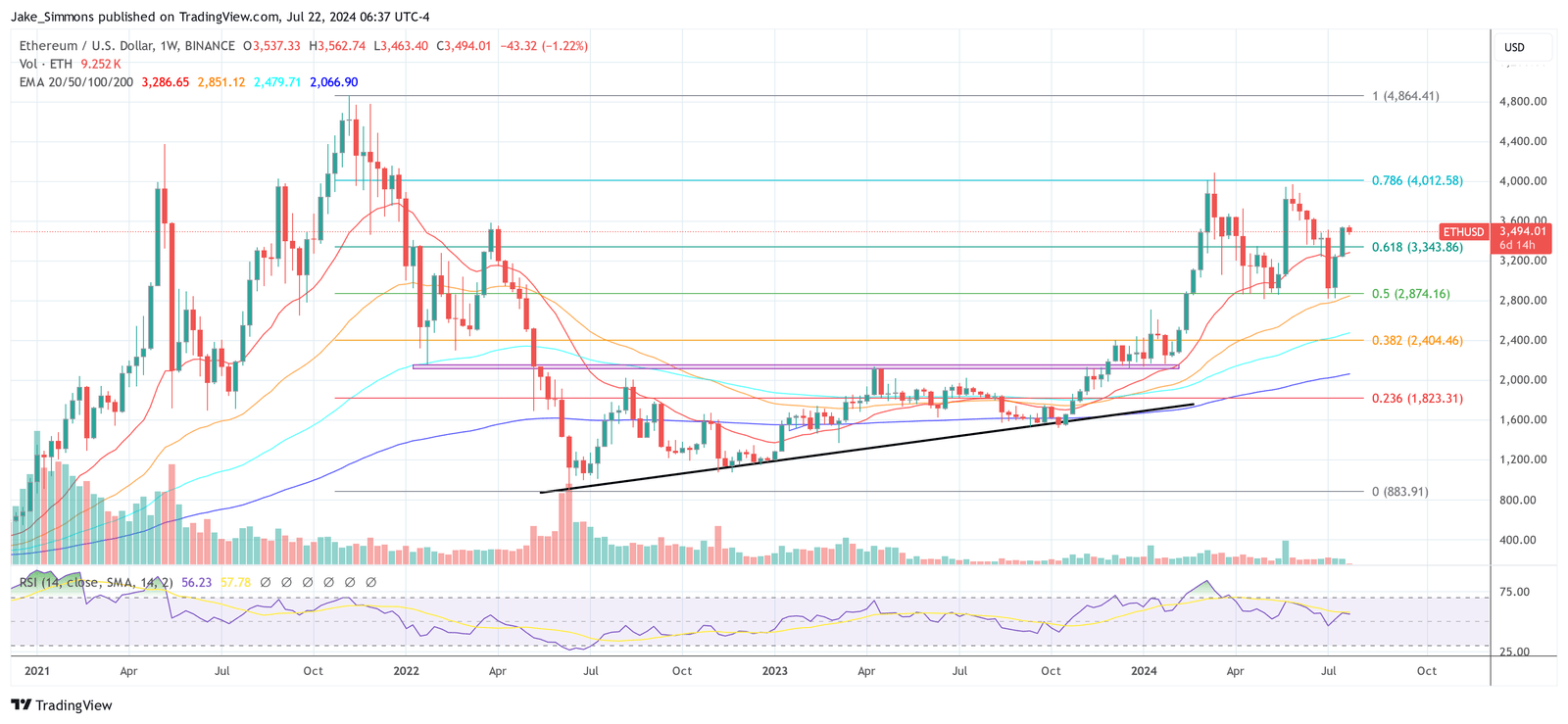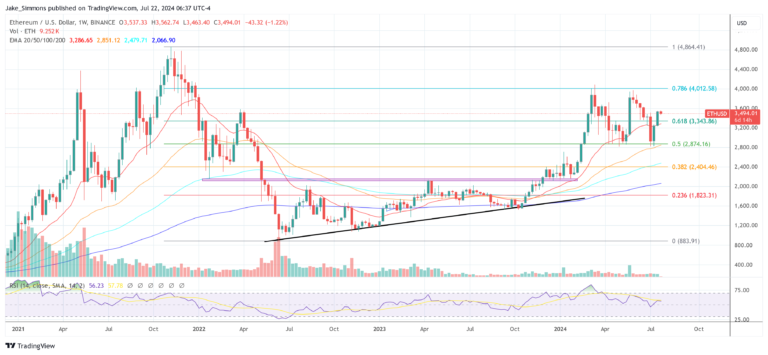The US spot Ethereum ETFs are set to launch on Tuesday, July 23rd, with projections indicating potential monthly inflows of $1.2 billion. This forecast comes from ASXN, a research firm specializing in crypto finance analytics.
US Spot Ethereum ETFs Could Surprise To The Upside
At the core of ASXN’s analysis is the comparison between the newly introduced Ethereum ETFs and the previously launched Bitcoin ETFs. One of the critical differentiators highlighted in the report is the fee structure. The Ethereum ETFs, while mirroring the fee approach of Bitcoin ETFs, introduce a notably competitive twist with Grayscale’s new ‘mini trust’ Ethereum product. Initially disclosed at a 0.25% management fee, the fee was quickly adjusted to 0.15% after competitive pressures from other low-fee products like Blackrock’s ETHA ETF.
Grayscale has strategically re-positioned 10% of its Ethereum Trust (ETHE) Assets Under Management (AUM) to this mini trust, offering ETHE holders an exchange to the new ETF at no tax liability—a move aimed at retaining capital within its ecosystem and providing a more attractive fee structure to fee-sensitive investors.
“Grayscale’s strategic adjustment of its fee structure and the innovative mini trust offering are likely to redefine the competitive landscape of Ethereum ETFs,” an ASXN analyst commented in the report. “This could not only stem potential outflows but also attract a broader base of institutional investors due to the more favorable fee dynamics.”
ASXN’s report also covers the potential market impact of the inflow of funds into Ethereum ETFs. Utilizing global data from existing crypto Exchange Traded Products (ETPs), the research draws parallels and contrasts between the Ethereum and Bitcoin markets. Historically, ETPs have been overweight in Bitcoin relative to Ethereum based on AUM ratios compared to market cap ratios. This has shifted slightly with Ethereum gaining more traction and investment confidence.
Referring to other research reports on potential ETF inflows, the report notes: “There have been many estimates for the ETF flows, some of which we have highlighted below. Taking the estimates and standardizing them yields an average estimate in the $1bn/month region. Standard Chartered Bank offers the highest estimate with $2bn/month, while JP Morgan is on the low end at $500m/month.”
ASXN’s estimate lies at $800 to $1.2 billion per month. “This was calculated by taking a market cap weighted average of monthly Bitcoin inflows and scaling this by the market cap of ETH,” the firm notes. Furthermore, they backed their estimates with the global crypto ETP data and “are open to an upside surprise given the unique dynamics of ETHE trading at par prior to the launch and the introduction of the mini trust.”
The Reflexivity Of ETH
In terms of liquidity, the report suggests that Ethereum’s market dynamics are distinct from those of Bitcoin. Although Ethereum’s overall liquidity is slightly lower, the impact of new ETF inflows could be more pronounced due to Ethereum’s lower ‘float’—the amount of an asset readily available for trading. “Ethereum’s liquidity profile, compounded by its smaller float relative to Bitcoin, implies that inflows into the ETF could have a disproportionately positive effect on its price,” states the report.
Moreover, ASXN’s analysis is devoted to the reflexivity inherent in Ethereum’s market. According to the report, inflows into Ethereum ETFs could lead to higher Ethereum prices, which in turn could increase activity and investments in the decentralized finance (DeFi) sector and other Ethereum-based applications. This feedback loop is supported by Ethereum’s tokenomics, specifically the EIP-1559 mechanism which burns a portion of transaction fees, effectively reducing the total supply of Ethereum over time.
“The reflexivity of Ethereum’s market extends beyond simple supply and demand dynamics due to its integral role in DeFi and other blockchain-based applications,” ASXN explains and adds, “as the price of Ethereum increases, it could significantly enhance the underlying fundamentals of the DeFi platforms, driving further investments and creating a self-reinforcing cycle of value appreciation.”
The report concludes with strategic insights for traditional finance (TradFi) institutions considering Ethereum investments. It argues that the narrative around Ethereum as a multi-faceted platform for decentralized applications provides a compelling value proposition beyond the “digital gold” narrative typically associated with Bitcoin.
ASXN also speculates on the future potential for a staked ETH ETF, which could attract TradFi players with its yield-generating capabilities. “The possibility of a staked ETH ETF could become a game-changer, offering traditional finance a way to engage with crypto assets that not only appreciate in value but also generate yield,” the report suggests.
At press time, ETH traded at $3,494.

Featured image created with DALL·E, chart from TradingView.com

